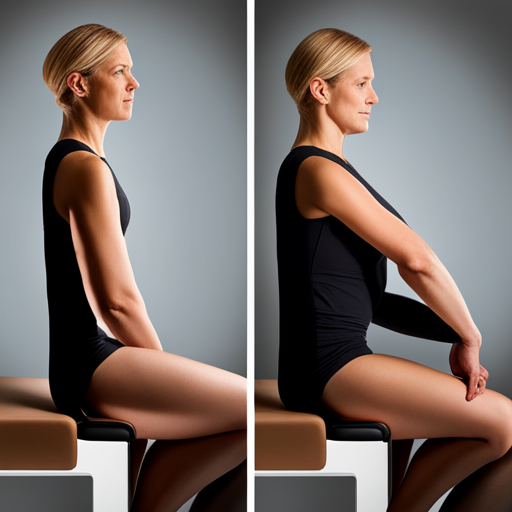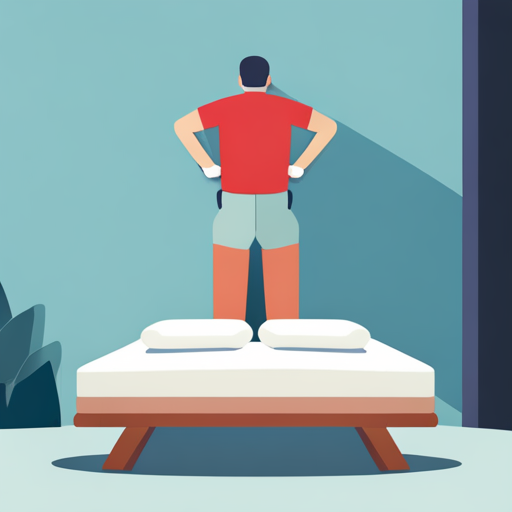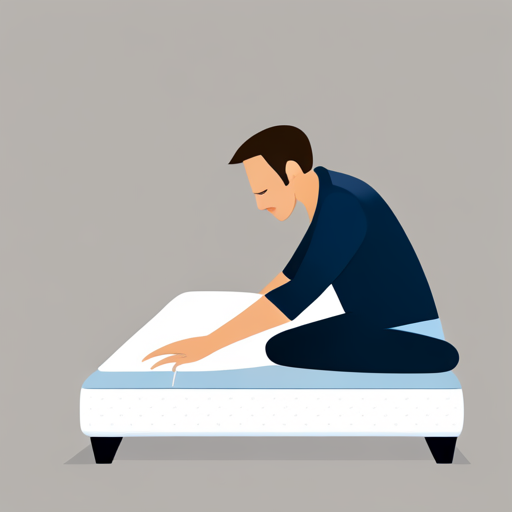Are you tossing and turning all night, only to wake up with a sore back? Well, let me tell you, your sleep positions could be to blame! Yep, the way you snooze can have a big impact on your spine. And I’m not just talking about fancy medical terms here, I’m breaking it down for you in simple words.
So, listen up!
Proper spinal alignment is super important when it comes to getting a good night’s sleep. And let me tell you, it’s not just about laying flat on your back like a board. Nope, there’s more to it than that. Whether you’re a back sleeper, a side snoozer, or a stomach slumberer, your spine is affected in different ways.
But don’t worry, I’m here to guide you through it all. I’ll explain how each sleep position can impact your spine, and give you some tips on finding the right pillow and mattress to keep your back happy.
So, get ready to sleep like a pro and wake up feeling refreshed and pain-free.
Let’s dive in, shall we?
Key Takeaways
- Proper spinal alignment is important for a healthy back and good night’s sleep.
- Sleeping on your back helps distribute weight evenly and reduces pressure on the back.
- Side sleeping can relieve pressure on the lower back and promote spinal alignment.
– Finding the right pillow and mattress that support spinal alignment is crucial.
The Importance of Proper Spinal Alignment

Did you know that proper spinal alignment while sleeping is super important for a healthy back? Yeah, it’s true! Having the right posture when you snooze can make a big difference in your spinal health.
So, what’s the deal with proper spinal alignment? Well, it’s all about keeping your spine in a straight line while you sleep. When you have good posture, it helps to distribute the weight evenly and takes the pressure off your back. This means less pain and discomfort for you.
Now, let’s talk about sleeping on your back. It’s one of the best ways to maintain proper spinal alignment throughout the night. So, keep reading to find out why it’s so beneficial for your back.
Sleeping on Your Back

Relaxing on your back during slumber not only lets you have a comfy sleep but also makes sure your spine is in the right position. It’s like giving your backbone a big, warm hug!
When you sleep on your back, your body weight is evenly distributed, which helps to keep your spine aligned. Plus, it reduces the pressure on your joints and muscles, so you wake up feeling less achy.
To make the most of back sleeping, try using a pillow that supports the natural curve of your neck and keeps your head in line with your spine. And here’s a little tip: placing a small pillow under your knees can take some stress off your lower back.
Now, let’s talk about another cool sleep position – sleeping on your side.
Sleeping on Your Side

Sleeping on your side is super good for your spine! It helps keep your back in a nice, straight line and can even relieve pressure on your lower back.
To make sure you’re doing it right, try to keep your head aligned with your spine and use a pillow that’s the right height for you.
Benefits of side sleeping for spinal health
Lying on your side, your spine is gently aligned and supported, promoting optimal spinal health. Side sleeping has several benefits for your posture and can help alleviate neck pain. Here are some reasons why side sleeping is good for your spine:
- Spinal alignment: Sleeping on your side keeps your spine straight, which reduces the risk of developing spinal problems.
- Reduced pressure: Side sleeping distributes your body weight evenly, relieving pressure on your spine and joints.
- Easy breathing: This position opens up your airways, making it easier to breathe while you sleep.
By choosing to sleep on your side, you’re taking a step towards maintaining a healthy spine.
Now let’s explore the best practices for maintaining alignment while side sleeping.
Best practices for maintaining alignment while side sleeping
When you choose to rest on your side, it’s important to follow these best practices to maintain proper alignment for a healthy spine.
Start by choosing the right side sleeping position. The fetal position, where you curl up like a baby, is great for reducing pressure on your spine. Another option is the log position, where you lie straight with your arms by your side. This helps keep your spine in a neutral position.
Make sure to use a supportive pillow that keeps your head and neck aligned with your spine. Placing a pillow between your knees can also help keep your hips aligned.
Lastly, avoid curling up too tightly or sleeping with your arm under your head, as this can strain your spine.
Now, let’s move on to sleeping on your stomach.
Sleeping on Your Stomach

Did you know that sleeping on your stomach can have a negative impact on your spine? Stomach sleeping has some disadvantages, especially when it comes to your neck and shoulders.
When you sleep on your stomach, you have to turn your head to the side to breathe, which can strain your neck. It also puts pressure on your shoulders, causing discomfort and pain. This position can mess up the natural alignment of your spine, leading to issues like back pain and stiffness.
So, if you want to avoid these problems, it’s important to find the right pillow and mattress that support your spine while you sleep. By choosing the proper sleep equipment, you can improve your spinal alignment and wake up feeling refreshed.
Finding the Right Pillow and Mattress

When it comes to finding the right pillow and mattress for your spine, it’s super important to make sure they support your spinal alignment. You gotta find ones that keep your spine straight and in a good position while you sleep.
When choosing, think about things like the firmness, size, and materials of the pillow and mattress to make sure they’re the best for your spine.
How the right pillow and mattress can support spinal alignment
Having the right pillow and mattress not only supports proper spinal alignment, but also ensures a comfy and good night’s sleep.
Your choice of pillow and mattress plays a crucial role in keeping your spine in a healthy position while you snooze. It’s important to find a pillow that provides adequate support for your neck and head, keeping them aligned with your spine.
Likewise, a mattress that is neither too firm nor too soft helps distribute your body weight evenly, preventing unnecessary pressure on your spine.
By choosing the right pillow and mattress, you can maintain a proper sleep posture and reduce the risk of developing back pain.
In the next section, we’ll explore factors to consider when picking the best pillow and mattress for your spine.
Factors to consider when choosing the best pillow and mattress for your spine
So, now that you know how important it is to have the right pillow and mattress for your spine, let’s talk about how to choose the best ones for a good night’s sleep.
There are a few factors you should consider when looking for the perfect fit. First, think about your sleeping position. Do you sleep on your back, your side, or your stomach? Different positions require different types of support.
Second, consider your body type and weight. A heavier person may need a firmer mattress to provide adequate support, while a lighter person may prefer a softer one.
Lastly, think about any specific health conditions you may have, such as back pain or allergies. Some pillows and mattresses are designed to address these issues.
By taking these factors into account, you can find the pillow and mattress that will keep your spine in alignment and give you the best night’s sleep possible.
Frequently Asked Questions
Can sleeping in certain positions worsen existing spinal conditions?
Sleeping in certain positions can worsen existing spinal conditions. Your body posture during sleep plays a role in the impact on spinal health. It’s important to be aware of how you position yourself to protect your spine.
Is it possible to train yourself to sleep in a different position?
Sure, you can totally change how you sleep! Sleeping on your back is super good for your spine. You can try using pillows or sleeping aids to help you transition to a new position. Sweet dreams!
What are the potential long-term effects of consistently sleeping in an improper position?
Consistently sleeping in a bad position can seriously mess up your health. Your spine needs to be aligned properly during sleep for overall well-being. Proper sleep positions are super important.
Are there any specific sleep positions that can alleviate back pain?
You can find relief from back pain by sleeping in the best positions for spinal alignment. Try sleeping on your back with a pillow under your knees, or on your side with a pillow between your legs.
How do different pillow and mattress combinations affect spinal alignment?
To understand how pillow selection and mattress firmness affect spinal alignment, you need to consider what feels comfortable for you. Finding the right combination can help support your spine and reduce any discomfort you may feel.
Conclusion
So there you have it, buddy! You now know how your sleep positions can mess with your spine. It’s super important to have proper spinal alignment when you snooze.
Did you know that about 80% of people experience back pain at some point in their lives? That’s a whole lot of folks dealing with achy backs, my friend.
So make sure to choose the right sleep position and grab yourself a comfy pillow and mattress. Your spine will thank you, dude!
